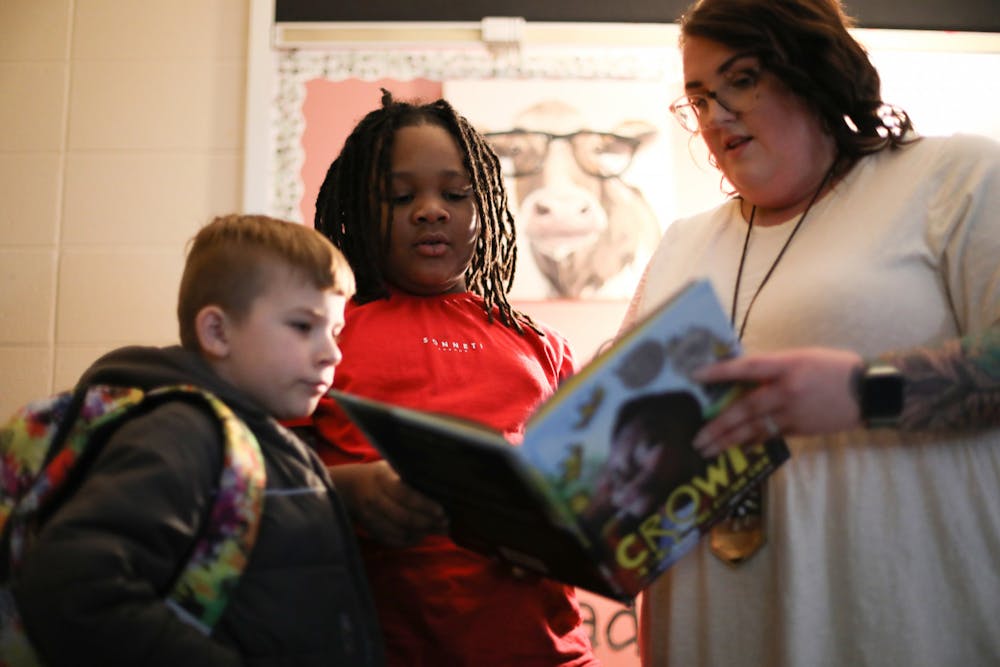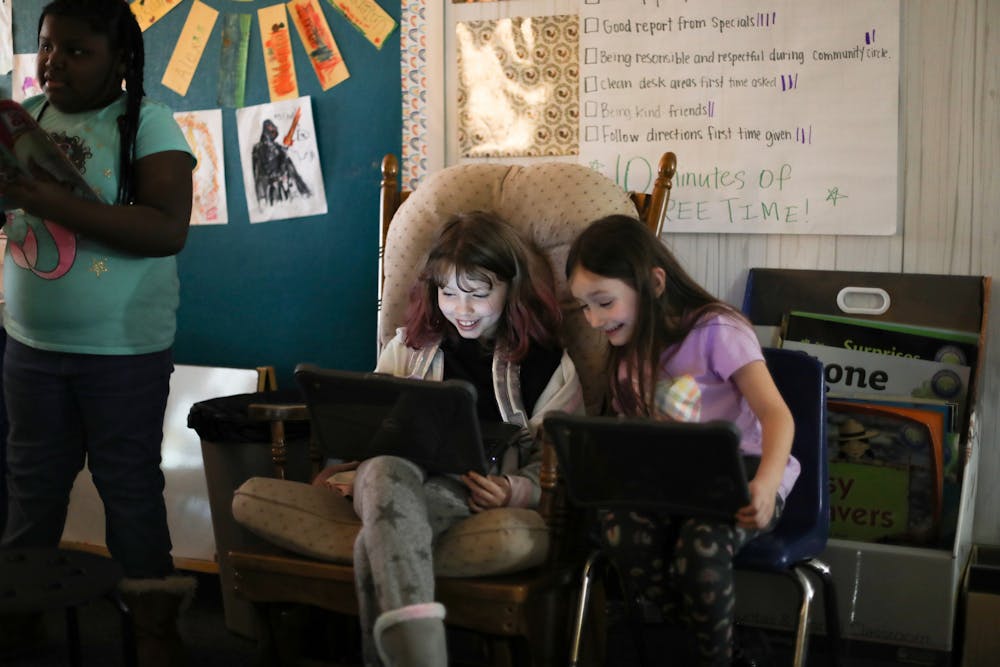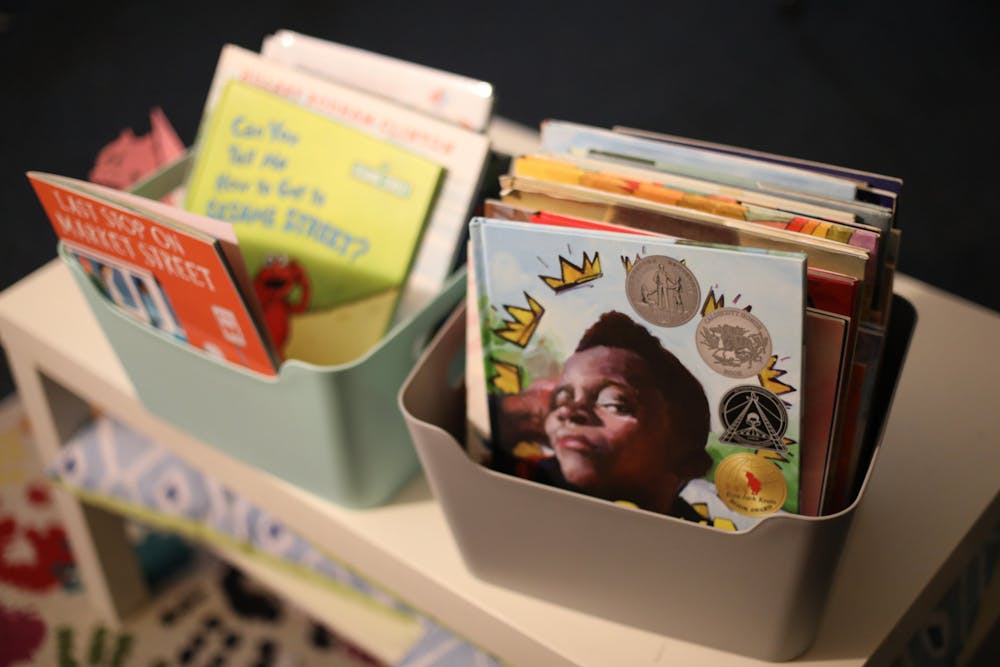In the corner of Hailey Maupin’s second-grade classroom, shelves of light blue buckets filled with books sit under a bench, waiting for children to take the opportunity to travel into another world.
Twenty minutes before the school day at South View Elementary School ended, students celebrated their Friday free time. Excitement radiated off the students as jokes and giggles filled the room while they listened to music on their tablets and looked through these shelves.
The books “Black is a Rainbow Color,” “Mixed Me,” “Too Many Tamales” and “You All Matter” were placed along Maupin’s personal library.
“I try to find books that will help them see themselves represented,” she said. “I want to provide books for students of color where the whole book isn’t around them being a person of color … also books that will help kids who don’t have those experiences … I want to give them a way to see someone else’s point of view, so that way they can have that experience and put themselves in someone else’s shoes.”
Though Ball State University and United Way help donate, Maupin said she buys most of her classroom’s books. She purchases books based on what her students are interested in.
One year, Maupin said she had multiple students who had lost parents.
“It’s hard to find children’s books about someone dying, but they're out there, and they’re helpful,” she said.
Maupin said reading these stories can be critical for students who have gone through those experiences to feel seen. It also helps students understand what an “unconventional” family looks like.
For the 2022-23 school year, Maupin didn’t buy any books. She listened to her students, or “friends” as she calls them, and waited to see what they liked, so she could surprise them with more later in the year.
Similarly to Maupin, Erin Eads, kindergarten teacher at South View, buys her own books. Eads said it can be difficult with interests constantly changing, especially for students at such a young age. Either way, she said it is important for all students to be represented. As a child, having a brown-haired Barbie meant a lot to the brunette teacher.
One book Eads pointed out was “The Proudest Blue” by Ibtihaj Muhammad and S.K. Ali. The cover of the book illustrates a woman in a blue hijab who is connected to a wave carrying a little girl in a paper boat.
Eads has two students from Afghanistan who came to the United States as refugees, so when she saw this book, she knew it was perfect.
“And when they saw the book, they were so excited that it looked like their mommy,” she said. “They were like, ‘It looks like me. It looks like my mommy.’ … I love that one. That one's amazing.”

Eads said one of the best moments about this process is seeing the students light up and realize a book is like them or someone they know.
“To show them these different things like, ‘Hey, this is possible, this is a thing,’” she said. “It kind of opens their little world. They’re more considerate of other people and their situations.”
According to Humanium, representation is important for children in literature and media because it provides them with models, helps them understand reality, allows them to discover other cultures and helps them develop empathy.
Research shows a lack of representation can cause negative psychological outcomes for people who are underrepresented or portrayed negatively. A study in 2012 on Research Gate by Nicole Martins and Kristen Harrison showed there was a negative correlation between TV exposure and low self-esteem for elementary-aged Black boys, Black girls and white girls, but there was a positive correlation for high self-esteem for white boys.
“What we’ll see in videos or books sometimes are just stereotypes,” Maupin said. “Even the bad character in the story being a person of color, small things like that. I always try to point things out sometimes and say, ‘Okay, hold on, is this true every time? Why do you think that the author did that? Why would the illustrator do that? What makes you think something differently? What is your opinion on that?’ It kind of builds their critical-thinking skills and allows them to think for themselves.”
According to Northfield Hospital Clinics, “reading regularly with young children stimulates optimal patterns of brain development which helps build strong pathways in the brain and in turn builds language, literacy and social-emotional skills that can have life-long health benefits.”
Both Maupin and Eads said they try to read to their students a lot, at least one book a day, in order to help this.
Because South View’s library is under construction, when students want to get a book outside of class, they have to visit the library next to the school.
South View Principal Anthony Williams said it’s important for both students and staff to be able to see themselves represented. The school also tries to show representation through its lesson plans. He said the curriculum for elementary school students has developed throughout Indiana and the U.S. to become more representative of all students.
Today, the teachers at Yorktown get sensitivity training and discuss adverse childhood experiences with professionals.
Deanna Harshman, fifth-grade teacher at Yorktown Elementary School, said because she grew up in an all-white, conservative school, she doesn’t remember seeing books or videos with students in wheelchairs, many people of color or families that weren't just a mom and a dad.
“It is widely becoming important to our administration now too, which is something I don't think used to be the case in the past,” Harshman said. “In old schools, people just came as they were. You’ve got teachers who have been teaching a long time, but they are kind of shifting their mindset too, so that's kind of cool to see.”
Today, Maupin tries to face important issues head on and allow the lessons and stories learned in class to be played out in real life.
For instance, one day, Maupin decided to have the students come up with a list of things they would like to see changed in the world.
The top of these posters read ‘Changes We Want to Make,’ and the list included “having freedom,” “every single person is nice and not racist,” “not being taken away from your family” and “ban guns from the world.”
The students enjoyed the activity so much, they ended up filling three posters.

Both teachers said they try to instill leadership skills in their classrooms to build confidence for the kids by calling them future leaders. However, Maupin said it can be a lot of pressure to make sure she is teaching kids the things that matter.
“You’re going home thinking, ‘Today was horrible. I didn’t do anything right, they did not get anything at all,’ but just knowing we have 180 days, and I tell them all the time, when you leave here, I want you to be able to read and write and do math, but I also want you to be a better person,” Maupin said. “And today, if all we learned was how to be a better person, then I'm okay with that.”
Harshman said during the 2021-22 academic year, a book called “Stone Fox” was in the curriculum and though it was a good book, it portrayed Native Americans in a bit of a negative way.
“Sometimes, you have to watch that when you're including those books in your plans,” she said. “You have to make sure you read it before you teach it, so I really try to consider whenever I use a book, I don't just [say], ‘Oh, this is about this subject’ and pull it out. I like to preview it and look at it first.”
Similarly to Eads and Maupin, Harshman collects books and puts them out based on what the children like to read that year. Because of book fairs and discounts, Yorktown Elementary School gets most of its books from Scholastic. Before that, though, Harshman bought a lot of the books herself.
She said the students are able to have tablets in school, so they can also read on a site called Epic. Epic allows them to read a variety of books throughout the school day, so they are open to topics that may not be discussed in class.
Harshman said because they are in a dominantly conservative area, some parents are unhappy by some of the books made available for students to read, say a book with two dads, for example. Therefore, the teachers have to be careful to not read them to the whole class but still have them accessible for students.
She said one year, parents questioned her after the students read “Because of Winn Dixie” in school, though the book was required. The book discusses the Civil War, slavery and a parent who is an alcoholic.
“There are kids in our classrooms who haven't been in slavery, but they may have ancestors who have been,” she said. “There may have been kids in our rooms whose parents have been alcoholics, and they can relate to that. And the other kids are so concerned when they hear that in the book, it kind of breaks their heart, so it almost makes it real for them to realize that kids actually do go through this.”
Harshman said students are mind blown when they hear about segregation because it’s “unheard of” today. She said their innocence regarding topics and how they perceive the world can be a lesson to learn from, especially with adults arguing so often.
“Kids need to see somebody that looks like them every day, not just in the classroom, but in a book, in a video,” Harshman said. “They need to hear things that they can relate to, a variety of religions, a variety of sexual identities, a variety of family structures. So, I think representation is just realizing that these kids all have their own unique backgrounds when they come into school and just making sure that we are not living in our own narrow [minds].”
Harshman said she is a religious person, but she doesn’t bring that into the classroom. She sets her beliefs aside and tries to be completely neutral about everything.
“Just be kind, be a kind human,” she said. “I want them to know how to do certain things, but … in the real world, they just need to learn how to be kind and respectful.”
While Harshman is managing perceptions of parents and families tied directly to her classroom, Maupin and Eads are confronting issues of a different kind.
“Because we are on the south side of Muncie … [families] have a bad [reputation] of not caring about their kids, about being addicted to drugs,” Maupin said. “That is far from the case … I have never met a parent that doesn't love their child ever in this building. That love might look different from something that I experienced when I was a child, but that doesn't mean that they still don't love them.”
Maupin said because of this false reputation, the school isn’t seen for how it really is. It isn’t given the credit it deserves, and the students aren’t seen for who they are.
“A lot of people look down on people from the southside [of Muncie automatically], so the odds are stacked against our kids … and some have already realized that … life is really hard,” she said. “They will grow up in school hearing ‘You’re a bad kid,’ … and when our kids hear negative things about them all the time, it’s what they become, so we’re preparing them to have self worth and to know they are good people even if they have done things that aren’t so great.”

Eads said she wants her kids to know resilience, how to keep pushing through hard times and still come out being a good person.
“We are an elementary school that’s filled with amazing children who are so talented and so smart in ways that we can’t even imagine, and unfortunately, that gets buried behind representation,” she said. “It’s hard to watch your kids go through that. I’m an adult, I can handle that … but these kids haven’t had their chances yet … that’s really hard. Perceptions and just terrible ideas are some of our biggest challenges, and the kids feel it.”
Eads said she went to a bachelorette party and a fellow teacher apologized to her once she found out she worked at South View. Once Eads said she loved her job, the teacher changed her tone. Eads said it’s important to be an advocate any way possible, to stand up for the school’s students and families.
“Our kids obviously face a lot of challenges, their families face a lot of challenges, but they are all bigger than all of that,” Maupin said. “We are going to be bigger than any challenge that they ever face, we just have to work together to get there because if we’re not, then we’re wasting time for our kids.”
Williams said perceptions can be a reality, but it depends on who has the lens.
“As long as [students] know that they are loved, then I think we've done our job,” Williams said. “It's okay to make mistakes. You know, as long as we learn from those mistakes, and as long as we don't repeat or duplicate those mistakes, then that's just a part of life.”
Through their experiences of teaching, Maupin and Eads learned important lessons from their students. Eads said the students have taught her how to overcome really tough things and know not to do it on her own. In between tears and complaints about bad-quality tissues, the teachers said the kids have taught them about love.
“There is nothing like being frustrated or having a hard day and having literally almost all of your kids come up to you and surround you in love and hugs and words of affirmation,” Eads said. “They are such amazing little friends. You can have a moment when maybe you aren't the nicest … and they still say, ‘Teacher, I love you.’”
Maupin agreed.
“It sounds like some cheesy, education movie, but I’m serious. I have never been so loved in my entire life,” she said. “I can lose my temper and feel really frustrated with the kids, but I know that they are so forgiving and understanding … The lessons that life, I thought, had taught me, I didn’t learn anything until I came to South View.”
Contact Lila Fierek with comments at lkfierek@bsu.edu.





